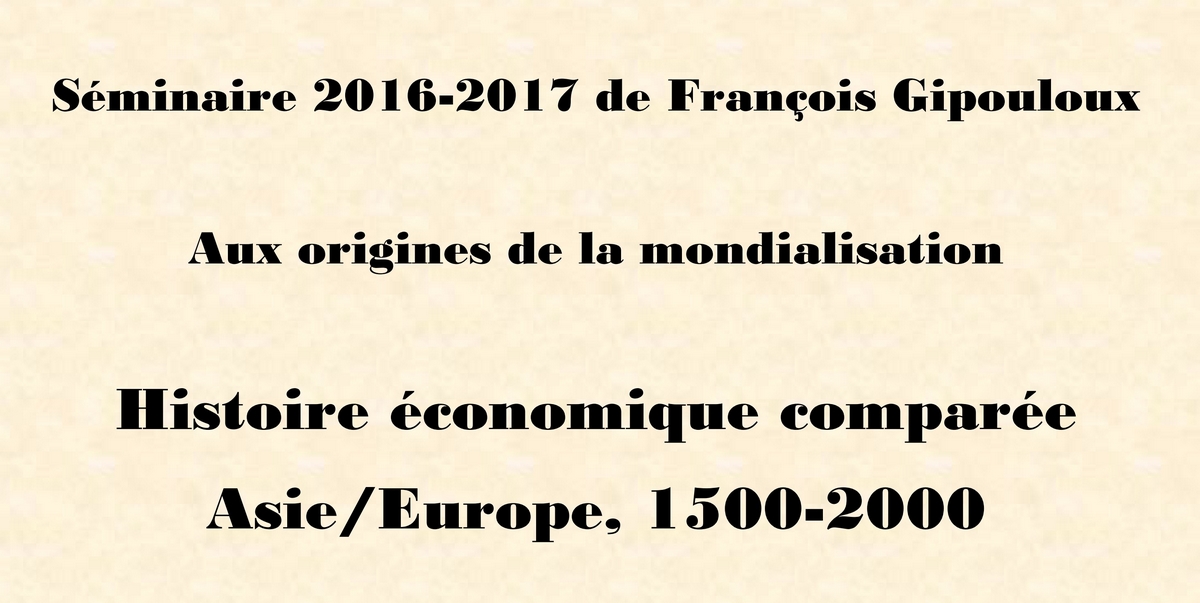Accueil > Actualités ultramarines > Séminaire "Aux origines de la mondialisation : histoire économique (...)
Séminaire "Aux origines de la mondialisation : histoire économique comparée Asie/Europe 1500-2000" (2016-2017) de François Gipouloux
Le 11 juin 2017 à 22h00
Aux origines de la mondialisation
Histoire économique comparée Asie/Europe, 1500-2000
Lundi 12 juin 2017, de 11:00 à 13:00.
Batiment A, 6e étage, A06_51 , 54 Bd Raspail 75006 Paris.
La séance sera consacrée à la présentation du Dr. Miguel Lourenço
Methods in the History of Cartography and Portuguese mercantile dynamics in 16th century East- and Southeast Asia
"As is well known Portuguese presence beyond the Straits of Melaka in the 16th century remained, largely, an informal and private enterprise in which the Crown played a very residual role. Portuguese merchants associated with Chinese, Japanese and Borneo merchants, securing active roles in trade routes connecting Borneo, the Philippines, China and Japan. Owing to the unofficial nature of this trade (later institutionalized to some extent in the cases of China and Japan), textual documentary evidence is lacking in order to fully recover the extent of these mercantile interests.
The study of Portuguese cartography provides a useful means to complement or even to further our knowledge on the entrepreneurships of Portuguese private merchants. By tracing genealogies of cartographic information recorded on maps (coastal depictions, toponymy) I intend to highlight rhythms of changes in the representation of geography and their relevance for the knowledge of mercantile motivations of Portuguese seafarers in the context of their informal activities."
Miguel Rodrigues
Le séminaire a lieu les 1er, 3e et 5e mardis du mois de 11 h à 13 h (salle 681, 6e étage, bât. Le France, 190-198 av de France 75013 Paris), du 15 novembre 2016 au 20 juin 2017
"Ce programme d’enseignement propose d’explorer une histoire économique comparée (Chine/Europe) en prenant pour objet d’étude les institutions économiques et les pratiques commerciales. Il s’agit d’une investigation, entreprise sur une vaste échelle, portant sur des institutions économiques ayant joué un rôle crucial dans la première mondialisation (XVIe siècle) et sur la « grande divergence » qui est advenue par la suite entre l’Asie et l’Europe. Le principal objectif de cette recherche est de comparer systématiquement la trajectoire d’institutions économiques et de pratiques d’affaires dans deux environnement bien différenciés – l’Europe occidentale et l’Asie (essentiellement la Chine et le Japon) –, sur une longue période, courant du XVIe au XXIe siècle, et en prenant pour fil directeur l’analyse des pratiques de trois grands réseaux marchands chinois : celui du Fujian, celui de Huizhou (Anhui), et celui du Shanxi."
Dans le cadre du séminaire de François Gipouloux "Aux origines de la mondialisation et de la ’grande divergence", Manuel Perez Garcia , professeur à l’Université du Peuple, à Pékin fera une présentation intitulée :
Global Encounters between China and Europe : Trade Networks, Consumption and Cultural Exchanges in Macau and Marseille (1680-1840)
Mardi 21 mars 2017, 11h-13h
Salle 681 (6e étage, Noyau B) , EHESS, 190 Avenue de France
Abstract :
In the last decade, the approaches of the global history have been emphasized in order to visualize the progress, form and method which historians have undertaken when carrying out ambitious research projects to analyse and compare diverse geographical and cultural areas of Asia and Europe. But when dealing with comparisons and cross-cultural studies in Europe and Asia, some scholarly works have exceeded of ambiguities when defining geographical units as well as chronology. In this project, I examine perceptions and dialogues between China and Europe by analysing strategic geopolitical sites which fostered commerce, consumption and socioeconomic networks between China and Europe through a particular case study : Macau, connecting with South China, and Marseille in Mediterranean Europe.
How did foreign merchant networks and trans-national communities of Macau and Marseille operate during the eighteenth century and contribute to somehow transfer respectively European and Chinese socio-cultural habits and forms in local population ? What was the degree and channels of consumption of European goods in China and Chinese goods in Europe ? These are the main questions to answer during my research to explore the bilateral Sino-European trade relations and how the trans-national dimension of exotic commodities changed tastes by creating a new type of global consumerism.
Such concrete comparison can help to narrow the gap that some researchers have created when widely analysing differences between Asia and Europe without a specific geographical and chronological delineation. The major novelty of this project is based on the use of Chinese and European sources to study changes in consumer behaviour. "
Source de l’information :
https://enseignements-2016.ehess.fr/2016/ue/254/
http://umr-ccj.ehess.fr/
http://cecmc.ehess.fr/index.php?2598
http://gdri.hypotheses.org/
http://cecmc.hypotheses.org/34062


